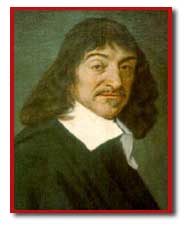Philosopher
of the Week. Nov. 4th, 2002.
Rene Descartes
The Kids Philosophy Slam now features
a philosopher of the week. Included with this new offering is
a brief biography and famous quotes of the featured philosopher,
ideas for classroom discussions, and links to related philosopher
sites! There will be a new philosopher of the week each and every
week through March!
Rene
Descartes (1596-1650) (France)
 Like
the ancient Greek philosopher Socrates, Rene Descartes used questions
to find truth. He questioned everything including his own existence.
"If you would be a real seeker after truth, it is necessary that
at least once in your life you doubt, as far as possible, all
things." He proved that he existed with the statement, "I think
therefore I am." Because he could think, he must exist. Descartes
used "hyperbolic doubt", a method of reasoning that stated that
though he may doubt, he cannot doubt that he exists.
Like
the ancient Greek philosopher Socrates, Rene Descartes used questions
to find truth. He questioned everything including his own existence.
"If you would be a real seeker after truth, it is necessary that
at least once in your life you doubt, as far as possible, all
things." He proved that he existed with the statement, "I think
therefore I am." Because he could think, he must exist. Descartes
used "hyperbolic doubt", a method of reasoning that stated that
though he may doubt, he cannot doubt that he exists.
Descartes was a scientist at heart and used science to explore
his ideas. He set out to trust only that which is clearly and
distinctly seen to be beyond any doubt. Anything that could be
doubted was rejected. This included God and the teachings of the
church. He believed that he could not trust his senses, because
distance can distort what you see. He came to the conclusion that
he could only trust mathematics because, awake or asleep, two
plus three always equals five.
By
use of this scientific reasoning, Descartes decided that reality
is made up of two separate things Ð mind (thinking) and body.
After establishing that he existed, he spent the rest of his life
trying to prove how minds and bodies work together. In the end,
he concluded that the body was like a machine connected to the
mind by a small gland in the brain.
Eventually,
Descartes moved from France to Holland because the Church was
persecuting scientists, such as Galileo, and he wanted to be free
to continue his work. Later he was invited to Sweden to teach
the Queen. While there, he caught pneumonia and died.
Classroom
discussion questions
How
would Descartes have answered the question, what is the meaning
of life?
How
would Descartes define truth?
Besides
math, what school subject(s) would Descartes have most valued
and why?
Why
was it so important to Descartes to first prove that he exists?
To
learn more about Rene Descartes, follow these links:
http://www.utm.edu/research/iep/d/descarte.htm
http://www-gap.dcs.st-and.ac.uk/~history/Mathematicians/Descartes.html
http://serendip.brynmawr.edu/Mind/Descartes.html
http://www.maths.tcd.ie/pub/HistMath/People/Descartes/RouseBall/RB_Descartes.html
http://es.rice.edu/ES/humsoc/Galileo/Catalog/Files/descarts.html
http://www.lucidcafe.com/library/96mar/descartes.html
http://philos.wright.edu/DesCartes/Meditations.html

